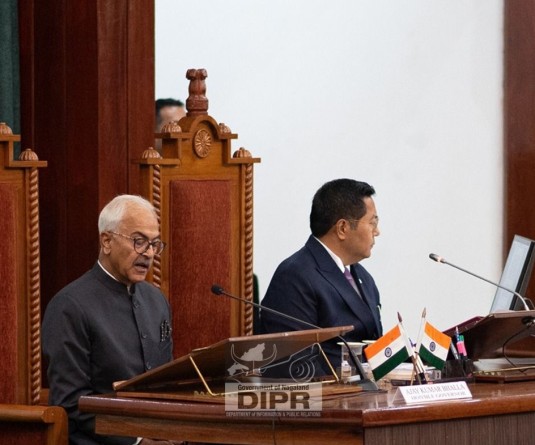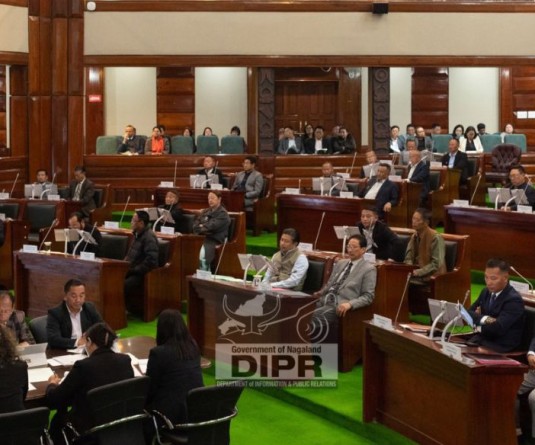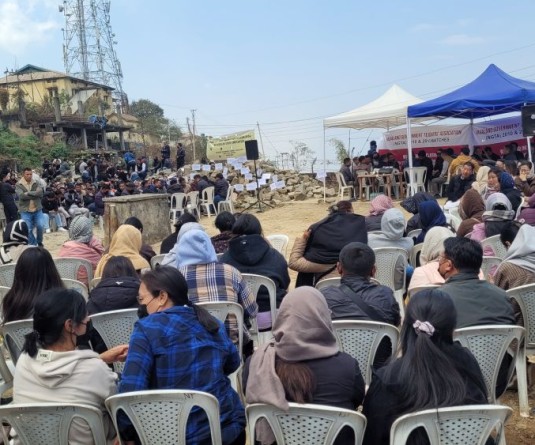Professor B.K. Konwar, Vice Chancellor of Nagaland University, speaks at the ‘Interactive Session’ of the NSF’s 25th General Conference, being held in Dimapur from April 24-26.
Dimapur, April 25 (MExN): The evening started late, with an adequate reprimand by the Naga Mothers’ Association (NMA) to the participants, but the interactive session on the second day of NSF’s 25th general conference was replete with ideas on how to “embrace a common vision”.
For Aküm Longchari, Editor of The Morung Express, this constituted in understanding the two assumptions of having a “common vision” and “embracing” it. Longchari had a model of thought for both. “Very often we find ourselves talking only about the past…we rarely talk about the future because we have become past-centric,” he said, asking the youth to dream and hope; to reconceptualize time to make this moment encapsulate the past, present and future.
This necessitates a common vision of this moment to be created. “All Nagas are needed to be invited to share and create a common vision through an inclusive and participatory process that is available and needs to be strengthened at all levels of our society,” stated Longchari in his paper presented today at the NSF general conference.
Today’s interactive session, chaired by K Inaka Assumi, saw the release of the NSF Souvenir by Special guest of the program, Professor B.K. Konwar, Vice Chancellor of Nagaland University, and greetings from the NMA.
Professor Konwar, while speaking to the students, said that the education scenario of the North East region is gloomy, as also the case in Nagaland. “Though Nagaland has the highest literacy rate of 81%, the reality is that less than 8% of the population makes it to higher education,” he said, adding that the 30% people living in the urban areas of Nagaland should think about the betterment of the 70% living in rural areas.
“Out of 54 colleges in Nagaland, majority are of arts and commerce. There are seven science colleges, with one for engineering technology and one for agriculture. The state needs colleges for the medical and veterinary sciences—those serving humanity need to be trained in these,” iterated Professor Konwar. “There are many challenges to this but you must dream, plan, execute and serve for the cause of humanity.”
This amalgamated, in a sense, with what Longchari had to offer before. “I have a vision,” said Longchari, “that by 2020, we should have either accomplished or started building a society based on shared trust, restorative justice, accountability, a culture of dignified labour...whose government is free of corruption, one that has infrastructure, good healthcare, visible employment opportunities, education, women’s representation and participation in decision making, growth, social and political reconciliation, value for natural resources and food security.”
Did the participants share the same vision? They did, as signified by a show of hands. “Our common future will be determined by the steps we take individually and collectively. Through intentional right speech, right action, right thinking and right livelihood, we begin to become the change we envision,” contemplated Longchari with the participants, stating this to be the praxis of reflection and action that will help “embrace” the “right relationship” that best determines the future of a shared humanity.
An invocation to the program was offered by Yanbemo Lotha, Associate Pastor Lotha Baptist Church Dimapur, followed musically by the Conference Choir. A special number on Change was presented by Alo Wanth, with the session wrapped up with an interaction with the participants moderated by Chingya Luithui.






